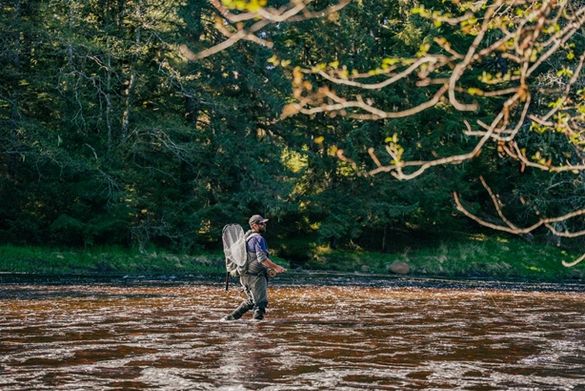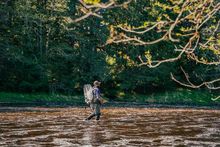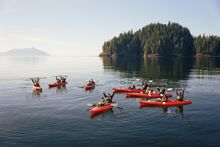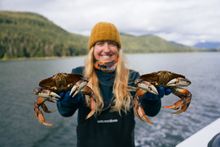 11 Sep 2025
11 Sep 2025
Tags: #theboatcompany

For Immediate Release
PONTE VEDRA, Fla., Sept. 9, 2025 – A 25-year-old policy that protects some 45 million acres of public lands – including the majority of the 17 million-acre Tongass National Forest in Alaska – is threatened by the Trump administration, and the president of The Boat Company, a non-profit cruise company in Alaska, is urging the public to act quickly and tell the U.S. government to keep this key conservation policy in place. The policy protects wilderness areas like the massive Tongass National Forest from roadbuilding, logging and mineral extraction, initiatives that will leave a permanent scar on one of the last substantially intact temperate rainforests on Earth.
“If the Roadless Rule is rescinded, the devastation of roadbuilding, logging and mineral extraction on this pristine national forest would be quick and far-reaching, and it can never be undone,” said Hunter McIntosh, president and executive of The Boat Company. “We would see the ecosystem's wildlife – from bears to salmon – impacted by human interference, and there is a significantly increased risk of wildfires, landslides and other disasters.”
The Boat Company is the world's only non-profit cruise company, and it has been providing monetary support for a broad range of conservation efforts for 40 years. The company has helped to fund every major lawsuit to protect the Tongass National Forest and other public lands in Southeastern Alaska.
If the Roadless Rule is rescinded, the impacts would be far-reaching.
What the Public Can Do:
The public can make their voices heard by submitting comments here by Sept. 19, when the comment period ends. Supporters can also sign this petition organized by Fight for the Forests.
Impacts on wildlife:
Southeastern Alaska is home to a broad range of wildlife including brown and black bears, wolves, moose, fox, porcupine, Sitka black-tailed deer, otters, harbor seals and bald eagles. There are also many species of saltwater and freshwater fish including five species of Pacific salmon as well as trout, char and halibut.
The addition of roads will result in:
· Increased wildlife deaths from vehicles
· Fragmented wildlife populations, which can lead to decreases in reproduction
· Pollution that harms wildlife and their habitats
· Genetic changes to wildlife populations, which is especially harmful to endangered species
Impacts on forests:
· Increased erosion and landslide risks
· Decreased frozen periods, which are important to the overall health of trees
· Climate change impacts
· Increased risk of wildfires
· Increased risk of floods
About the Roadless Rule:
The Roadless Area Conservation Rule – broadly known as the “Roadless Rule” – has been in place since the waning days of the Clinton Administration in 2001. The rule protects 45 million acres of forestland from roadbuilding, logging and oil and gas drilling.
When George W. Bush took office, his administration delayed implementation of the rule and embarked upon a campaign to roll it back through a series of lawsuits and new rules and legislation. Some were successful, and various states were able to achieve “compromises” that allowed for timber sales, including the state of Alaska supporting an exemption on the logging ban in the Tongass National Forest.
For the past 16 years, the pattern has remained consistent: Democratic administrations have sought to uphold and strengthen the rule while Republicans have adopted a strategy of attempting to circumvent, delay and overturn it.
More About The Boat Company:
The Boat Company was founded in 1979 by Michael McIntosh, Sr., who purchased a decommissioned U.S. Navy minesweeper, converted it to a tour boat and began offering week-long cruises. He set up the company as a non-profit organization so funds could be funneled to variety of conservation efforts.
Hunter McIntosh is continuing his father's mission by supporting conservation initiatives as well as actively supporting the local economies of Sitka and Juneau by purchasing local produce, hiring residents and working with local businesses whenever possible.
Cruises are scheduled from mid-May through mid-September and feature seven-day itineraries between Juneau and Sitka. The two boats make the roughly 300 nautical mile journeys – either north to south or vice versa – beginning each Sunday and ending Saturday before they turn around and head in the opposite direction.
Every day's itinerary offers an array of adventures including fishing, guided hikes, beach combing, wildlife viewing and kayaking.
The Boat Company is accepting reservations for 2026 cruises now, with the first cruise of the year departing on May 10. More information is available by visiting The Boat Company's website or calling 1-360-697-4242.
###
About The Boat Company
Founded in 1979, The Boat Company is a non-profit, conservation-focused luxury cruise operator specializing in sustainable tourism in Southeast Alaska. Through unique itineraries and a commitment to environmental stewardship, The Boat Company offers transformative travel experiences while advocating for the preservation of the Tongass National Forest.
Media contact:
Mesereau Travel Public Relations
720-284-1512
mona@mesereaupr.com
tom@mesereaupr.com
#theboatcompany
#alaskacruise
#flyfishing
#whalewatching
#tongassnationalforest
#alaska
#cruise
#wildlife




